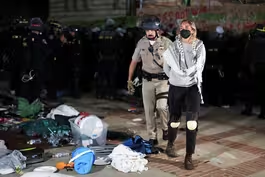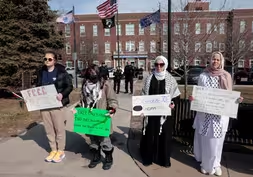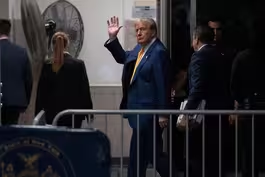
Analyzing the consequential Supreme Court term
Clip: 5/2/2024 | 7m 57sVideo has Closed Captions
Analyzing the consequential Supreme Court term and its ideological divide
The Supreme Court wrapped up oral arguments and has now turned to rolling out decisions in some of the most consequential cases of the year. Those decisions will shape policies nationwide on divisive issues like homelessness and reproductive rights, and some of them could affect the presidential election. John Yang discussed more with NewsHour Supreme Court analyst Marcia Coyle and Joan Biskupic.
Problems playing video? | Closed Captioning Feedback
Problems playing video? | Closed Captioning Feedback
Major corporate funding for the PBS News Hour is provided by BDO, BNSF, Consumer Cellular, American Cruise Lines, and Raymond James. Funding for the PBS NewsHour Weekend is provided by...

Analyzing the consequential Supreme Court term
Clip: 5/2/2024 | 7m 57sVideo has Closed Captions
The Supreme Court wrapped up oral arguments and has now turned to rolling out decisions in some of the most consequential cases of the year. Those decisions will shape policies nationwide on divisive issues like homelessness and reproductive rights, and some of them could affect the presidential election. John Yang discussed more with NewsHour Supreme Court analyst Marcia Coyle and Joan Biskupic.
Problems playing video? | Closed Captioning Feedback
How to Watch PBS News Hour
PBS News Hour is available to stream on pbs.org and the free PBS App, available on iPhone, Apple TV, Android TV, Android smartphones, Amazon Fire TV, Amazon Fire Tablet, Roku, Samsung Smart TV, and Vizio.
Providing Support for PBS.org
Learn Moreabout PBS online sponsorshipThe Supreme Court wrapped up oral arguments last week and has now turned to rolling out decisions.
As John Yang explains.
They could be some of the most consequential cases of the year.
John.
I'm going to some of those decisions will shape policies nationwide on such divisive issues like homelessness and reproductive rights.
And some of them could even affect the presidential election.
The passions surrounding these issues were reflected in protests outside the court on oral argument days.
Now, inside the court, the justices are spending the next two months or so searching for agreement among at least five of them in the 43 cases that remain undecided.
Watching all of this are two Supreme Court analysts.
The NewsHour is Marcia Coyle and Joan Kubik of CNN, author of Nine Black Robes.
Joan, Marcia, thanks for being here.
Marcia.
61 oral arguments this session.
Was there any common theme or thread running through them?
Well, John, I think there were a number of themes.
But I'd step back for a moment and take a look at the court a little bit and say that this appears, especially this term, to be a very confident court, willing to step into some of the most divisive issues, maybe even eager by some of them to take on these questions.
And we see it in the arguments that we listen to everything, from, EPA's Good Neighbor Plan for, the Clean Air Act to, abortion to of course, what may very well define the term trumps litigation.
Talk about those.
There were there were, what, four cases involving the four.
Personal and three that most people will know about.
You know, Donald Trump has loomed over the Supreme Court from the start.
When he was president, he was constantly saying, just wait till my cases get to the Supreme Court.
And of course, he names three of these nine justices.
And he felt like he had, you know, a little bit of ownership there.
And we've already seen one of the Trump cases come down.
The justices ruled unanimously that an anti insurrectionist provision of the 14th amendment could not be used to keep him off the ballot.
That was the Colorado case.
But now we just had two more recent ones that could be very consequential for him.
Most strikingly will be the test of whether he can be immune from criminal prosecution in the four charges brought by special counsel Jack Smith.
And also, Donald Trump did a lot to shape this current court.
This is a fourth year.
You have the supermajority of six conservative justices.
Is there any sense, as the oral arguments went on this year?
And is there any sense that there's still sort of evolving, coalescing, trying to figure out how to dance together?
Definitely.
You've got you've got the three liberals in the six conservatives, but they're not all created equal on both sides.
For example, on the conservative side with the six, you have a great difference in terms of personality and also kind of urgency on the part of Sam Alito, who's 74 and really wants the court to be moving pretty fast to the right.
But then you have Amy Coney Barrett, who's only 52.
She was the third appointee of Donald Trump who takes a little bit more pragmatic, slower approach.
They're both conservatives, but they're they're signaling, in a different way about how far they want to go.
Same on the left side.
You've got someone who's very strategic in Justice Elena Kagan, one of the President Obama appointees, and our newest, Justice, Ketanji Brown Jackson, the only appointee of President Joe Biden at this point, who is, more independent and consistently liberal, as opposed to, Justice Kagan, who, as I say, is a little bit more transactional.
Marcia, I want to talk a little bit more about Justice Barrett, because, yes, as, as eager to go as Samuel Alito.
Is she this this term?
There were a number of times she said, well, let's wait let's not move so fast.
Let's just decide what's in front of us.
Yeah.
I think this term in particular, I mean, she did indicate in some earlier cases, for example, a case involving, a Catholic foster child agency not willing to immediately overturn, a religion, precedent that, some of the, her more conservative colleagues and the religious right would love to see, but she would not do that.
She also was very cautious in an Indian child welfare, challenge, not to go down the road of race.
And then this term, as Jonas has pointed out, her questions, for example, in the Trump immunity case.
She was more focused on acts that could actually be tried and not on a rule for the ages, as Justice Gorsuch wanted.
And and there have been other cases where, she has shown more caution, but I, I'd caution everybody to know that it's very early.
And we have to see how she writes, not only how she votes, but what she writes.
And, you know, it gets very difficult, labeling some of these conservatives as maybe a moderate.
She's being called now a moderate conservative like John Roberts.
And yet you have to remember that she was shortly put on the bench in the Supreme Court when.
To overturn Roe v Wade this term.
Marcia, there have been 18 decisions have been handed down.
All but three of them were unanimous, and the other three were lopsided.
Are they getting the easy ones out?
The things they can agree on?
Out now and then.
Fight about the rest?
Yes, John.
Of course.
And that is sort of been their pattern for many, many terms.
And it's a very humankind, the pattern.
Get out what you can quickly so that you have more time to focus on the really complicated ones.
Although, you know, over the course of the Roberts Court, there has been generally a good degree of unanimity.
You know, you say 61 cases, but there's really only a handful of cases that we tend to focus on that we're going to end up being very divisive.
John, this is the almost the 20th year of John Roberts.
The Roberts Court described the Roberts Court as it is now.
So I think it's still very divided.
It's the cases that we care about most that come down to six 3 or 5 four.
And there's the ones John Roberts is constantly trying to bring, greater, if not unanimity, a bit of a more lopsided rule.
And let's just take, for example, on the Trump immunity case.
You know, he has struggled in the past on Trump cases.
For example, in 2020, when he handled the documents, cases worked very hard behind the scenes to take five four initial votes and make him 7 to 2.
And I could see him doing that here with the Trump immunity won, because as much as he himself is very conservative.
Remember John, he cut his teeth in the Reagan administration.
He's been pretty consistently conservative.
He's also aware of the standing in the public eye of this court and how much it stature has been diminished in recent years.
So I think what he's going to do want to show in some of these more divisive cases, you know, on and Trump claims on some regulatory matters and maybe even on some of the abortion ones that they've heard is to try to bring both sides to a, more of a compromise.
You're always going to have someone like Justice Clarence Thomas, probably Samuel Alito, Marcia, over further to his right.
But I think he's going to try to, win greater compromise because that's the stamp he's trying to put on this court.
I think, John, we have to remember, too, that this is still on Supreme Court time, a relatively young court.
And, I remember one justice telling me that when you get a new, new justice on the bench, it's a lot like a marriage and a new marriage, or it's like getting a new family member.
You have to get used to how that person wants to operate, and that takes time.
Is it going to be someone like, retired Justice Breyer who like to sit down in other chambers and chat about cases?
Or is it somebody who just wants to use draft John Bisquick?
Marcia Coyle, thank you both very much.
My pleasure.
John.
Thanks, John.
Biden condemns violence as some college protests escalate
Video has Closed Captions
Clip: 5/2/2024 | 9m 7s | Biden condemns violence and disorder as some college protests escalate into confrontations (9m 7s)
Book explores how ordinary people can be heroes of democracy
Video has Closed Captions
Clip: 5/2/2024 | 8m 31s | New book explores how ordinary Americans can be the heroes of democracy (8m 31s)
How young Michigan voters feel about the upcoming election
Video has Closed Captions
Clip: 5/2/2024 | 9m 48s | How young Michigan voters feel about Biden, Trump and the upcoming election (9m 48s)
Niece of American held in Gaza on efforts to bring him home
Video has Closed Captions
Clip: 5/2/2024 | 6m 39s | Niece of American held hostage in Gaza for 8 months updates efforts to bring him home (6m 39s)
Testimony in Trump trial continues after gag order hearing
Video has Closed Captions
Clip: 5/2/2024 | 4m 8s | Testimony in Trump hush money trial continues after 2nd gag order hearing (4m 8s)
Providing Support for PBS.org
Learn Moreabout PBS online sponsorship
- News and Public Affairs

FRONTLINE is investigative journalism that questions, explains and changes our world.

- News and Public Affairs

Amanpour and Company features conversations with leaders and decision makers.












Support for PBS provided by:
Major corporate funding for the PBS News Hour is provided by BDO, BNSF, Consumer Cellular, American Cruise Lines, and Raymond James. Funding for the PBS NewsHour Weekend is provided by...




